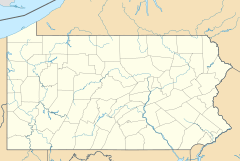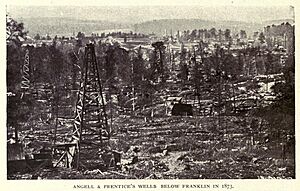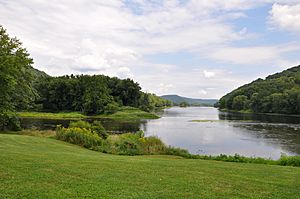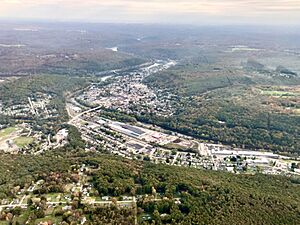Franklin, Pennsylvania facts for kids
Quick facts for kids
Franklin, Pennsylvania
|
||
|---|---|---|
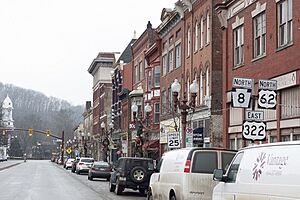
Downtown Franklin
|
||
|
||
| Nickname(s):
The Victorian City
|
||
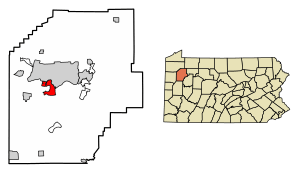
Location of Franklin in Venango County, Pennsylvania.
|
||
| Country | United States | |
| State | Pennsylvania | |
| County | Venango | |
| Settled | 1740s | |
| Platted | 1795 | |
| Incorporated (borough) | 1828 | |
| Incorporated (city) | 1868 | |
| Named for | Benjamin Franklin | |
| Area | ||
| • Total | 4.80 sq mi (12.44 km2) | |
| • Land | 4.68 sq mi (12.11 km2) | |
| • Water | 0.13 sq mi (0.33 km2) 1.70% | |
| Population
(2020)
|
||
| • Total | 6,077 | |
| • Density | 1,299.34/sq mi (501.67/km2) | |
| • Demonym | Franklinite | |
| Time zone | UTC−5 (EST) | |
| • Summer (DST) | UTC−4 (EDT) | |
| ZIP Code |
16323
|
|
| FIPS code | 42-27456 | |
Franklin is a city in Venango County, Pennsylvania, United States. It is the county seat, meaning it's the main government center for the county. The city is located where two rivers meet: French Creek and the Allegheny River.
In 2020, about 6,097 people lived in Franklin. The city is part of the larger Oil City area. Franklin is famous for its three-day autumn festival called Applefest. This event happens every October and brings in many thousands of visitors.
Contents
History of Franklin
Franklin is built where French Creek joins the Allegheny River. This spot was very important for hundreds of years. Native Americans used it as a key travel route. They created a path called the Venango Path. This path connected French Creek to Presque Isle Bay on Lake Erie. This way, people could easily travel between the Ohio River and the Great Lakes.
Early Settlements and Forts
In the 1740s, a fur trader from Scotland named John Fraser built a trading post here. It was in a Lenape village called Venango. The French also wanted to control this area. They hoped to connect their colonies in Canada (New France) with their lands along the Ohio and Mississippi rivers.
Before the French and Indian War began, the French built four forts. These forts helped them control the Venango Path and the important rivers. The forts were Fort Presque Isle, Fort Le Boeuf, Fort Machault, and Fort Duquesne.
In December 1753, George Washington, who was a 21-year-old major in the Virginia militia, visited the area. He was sent to Fort Le Boeuf to tell the French to leave British land. The French commander gave him a letter saying the message should go to the French leader in Quebec.
The French kept their forts, including Fort Machault, until July 1759. They left after losing Fort Niagara to the British. Before leaving, the French burned Fort Le Boeuf and Fort Machault. This was to stop the British from using them.
British Control and Town Growth
In 1760, the British built Fort Venango where Fort Machault had been. In 1763, Native Americans who were allies of the French attacked the British. The British colonists had often attacked Native American tribes, even neutral ones like the Lenape.
After the war, the British Americans built Fort Franklin here. It was named after Benjamin Franklin.
In 1787, Andrew Ellicott helped plan the town of Franklin. The town grew around the fort and became a trading center for the farming area. Later, in the late 1800s, oil was found nearby in Titusville. Franklin quickly became a busy oil town. When more oil was found in other states like Texas, many oil companies moved west. Franklin then became known for its machinery companies.
Geography
Franklin is located where French Creek and the Allegheny River meet. This is a beautiful natural spot.
Climate in Franklin
| Climate data for Franklin, Pennsylvania (1991–2020 normals, extremes 1897–present) | |||||||||||||
|---|---|---|---|---|---|---|---|---|---|---|---|---|---|
| Month | Jan | Feb | Mar | Apr | May | Jun | Jul | Aug | Sep | Oct | Nov | Dec | Year |
| Record high °F (°C) | 73 (23) |
74 (23) |
90 (32) |
93 (34) |
97 (36) |
101 (38) |
106 (41) |
104 (40) |
100 (38) |
90 (32) |
81 (27) |
74 (23) |
106 (41) |
| Mean daily maximum °F (°C) | 33.7 (0.9) |
36.3 (2.4) |
45.6 (7.6) |
59.7 (15.4) |
70.9 (21.6) |
78.7 (25.9) |
82.7 (28.2) |
81.2 (27.3) |
74.2 (23.4) |
61.4 (16.3) |
49.0 (9.4) |
38.1 (3.4) |
59.3 (15.2) |
| Daily mean °F (°C) | 26.0 (−3.3) |
27.5 (−2.5) |
35.5 (1.9) |
47.4 (8.6) |
58.5 (14.7) |
67.1 (19.5) |
71.1 (21.7) |
69.8 (21.0) |
62.9 (17.2) |
51.1 (10.6) |
40.3 (4.6) |
31.2 (−0.4) |
49.0 (9.4) |
| Mean daily minimum °F (°C) | 18.3 (−7.6) |
18.7 (−7.4) |
25.4 (−3.7) |
35.2 (1.8) |
46.1 (7.8) |
55.5 (13.1) |
59.6 (15.3) |
58.3 (14.6) |
51.7 (10.9) |
40.8 (4.9) |
31.7 (−0.2) |
24.3 (−4.3) |
38.8 (3.8) |
| Record low °F (°C) | −30 (−34) |
−27 (−33) |
−22 (−30) |
0 (−18) |
20 (−7) |
28 (−2) |
33 (1) |
36 (2) |
23 (−5) |
15 (−9) |
0 (−18) |
−14 (−26) |
−30 (−34) |
| Average precipitation inches (mm) | 3.27 (83) |
2.66 (68) |
3.36 (85) |
4.15 (105) |
4.00 (102) |
4.86 (123) |
5.32 (135) |
4.24 (108) |
3.94 (100) |
3.76 (96) |
3.41 (87) |
3.36 (85) |
46.33 (1,177) |
| Average snowfall inches (cm) | 17.9 (45) |
11.5 (29) |
8.9 (23) |
1.1 (2.8) |
0.0 (0.0) |
0.0 (0.0) |
0.0 (0.0) |
0.0 (0.0) |
0.0 (0.0) |
0.0 (0.0) |
2.6 (6.6) |
11.7 (30) |
53.7 (136) |
| Average precipitation days (≥ 0.01 in) | 17.9 | 14.7 | 14.2 | 14.3 | 14.5 | 13.6 | 12.3 | 11.6 | 11.2 | 14.9 | 14.1 | 16.9 | 170.2 |
| Average snowy days (≥ 0.1 in) | 9.4 | 7.5 | 4.2 | 0.6 | 0.0 | 0.0 | 0.0 | 0.0 | 0.0 | 0.0 | 1.9 | 6.0 | 29.6 |
| Source: NOAA | |||||||||||||
Population of Franklin
| Historical population | |||
|---|---|---|---|
| Census | Pop. | %± | |
| 1810 | 159 | — | |
| 1820 | 252 | 58.5% | |
| 1830 | 410 | 62.7% | |
| 1840 | 595 | 45.1% | |
| 1850 | 936 | 57.3% | |
| 1860 | 1,303 | 39.2% | |
| 1870 | 3,876 | 197.5% | |
| 1880 | 5,010 | 29.3% | |
| 1890 | 5,827 | 16.3% | |
| 1900 | 7,167 | 23.0% | |
| 1910 | 9,767 | 36.3% | |
| 1920 | 9,970 | 2.1% | |
| 1930 | 10,254 | 2.8% | |
| 1940 | 10,187 | −0.7% | |
| 1950 | 10,006 | −1.8% | |
| 1960 | 9,586 | −4.2% | |
| 1970 | 9,127 | −4.8% | |
| 1980 | 8,643 | −5.3% | |
| 1990 | 7,926 | −8.3% | |
| 2000 | 7,156 | −9.7% | |
| 2010 | 6,545 | −8.5% | |
| 2020 | 6,097 | −6.8% | |
| 2021 (est.) | 6,031 | −7.9% | |
| Sources: | |||
In 2018, there were 6,078 people living in Franklin. There were about 2,989 households. A household is a group of people living together.
Most people in the city (about 95%) were White. About 3% were African American. The rest were from other racial backgrounds.
About 27% of households had children under 18. The average household had 2.27 people. The average family had 2.94 people.
The population included people of all ages. About 23.8% were under 18. About 18.5% were 65 or older. The average age in the city was 40 years old.
Arts and Culture
Franklin is home to the DeBence Antique Music World. This museum has over 100 old mechanical musical instruments. It's like a collection of antique music boxes and player pianos.
Sports
In 1903, Franklin had one of the first professional football teams. They were called the Franklin Athletic Club. That year, they were unofficially named the "US Football Champions." They also won the 1903 World Series of Football. This championship was held in December at Madison Square Garden. The team had several top players of that time.
Franklin Area High School has also won two state basketball championships. The boys' team won in 2001 and 2006. They beat teams from Allentown and Philadelphia to win these titles.
Education
The Franklin Area School District serves many students in the area. It has one high school, one middle school, and three elementary schools. These elementary schools are Central, Sandycreek, and Victory. About 2,278 students attend schools in this district.
The Valley Grove School District also serves the Franklin area. It has one high school and one elementary school. About 1,026 students attend schools in this district. The elementary school was rebuilt and reopened in 2007.
Transportation
Franklin is served by the Venango Regional Airport. This airport helps people travel to and from the city.
Notable People
Many interesting people have connections to Franklin:
- Timothy A. Barrow (1934–2019) – A businessman and politician from Arizona.
- John Wilkes Booth (1838–1865) – Abraham Lincoln's assassin. In 1863, he started an oil company in Franklin. He also lived there and performed at the Franklin Opera House.
- Nate Byham (born 1988) – A former NFL tight end who played for the San Francisco 49ers.
- Kid Butler – A player in MLB (Major League Baseball).
- Richard Frame – A politician.
- Jack Fultz (born 1948) – The winner of the 1976 Boston Marathon.
- Alexander Hays (1819–1864) – A Union general during the Civil War. He was known for his service at Gettysburg.
- Samuel Hays (1783–1868) – A U.S. Congressman.
- Nate Karns (born 1987) – An MLB pitcher who played for the Baltimore Orioles.
- Judge Robert Lamberton (1809–1885) – A judge in Venango County and founder of the Lamberton Savings Bank.
- Rolland Lawrence (born 1951) – An NFL cornerback for the Atlanta Falcons.
- Hildegarde Dolson Lockridge (1908–1981) – An author who wrote mystery novels and history books.
- Ted Marchibroda (1931–2016) – An NFL quarterback and head coach.
- Alexander McDowell (1845–1913) – A member of the United States House of Representatives.
- Charles Miller (1843–1927) – A businessman and commander in the Pennsylvania National Guard Division.
- Jesse L. Reno (1823–1862) – A major general in the United States Army.
- George C. Rickards (1860–1933) – A major general in the United States Army and Chief of the National Guard Bureau.
- Sean W. Rowe (born 1975) – A Bishop in the Episcopal Diocese of Northwestern Pennsylvania.
- Frank Saddler (1864–1921) – A Broadway orchestrator and music arranger, born in Franklin.
- Joseph C. Sibley – A livestock breeder, farmer, and politician who served in the U.S. House of Representatives.
- Bill Slocum – A politician.
- George R. Snowden (1841–1932) – A major general in the Pennsylvania National Guard.
- Mary Jo White (born 1941) – A Pennsylvania state senator.
- John A. Wiley (1843–1909) – A National Guard major general.
- Howard Zahniser (1906–1964) – An environmental activist who wrote the Wilderness Act.
See also
 In Spanish: Franklin (condado de Venango, Pensilvania) para niños
In Spanish: Franklin (condado de Venango, Pensilvania) para niños
 | William L. Dawson |
 | W. E. B. Du Bois |
 | Harry Belafonte |



